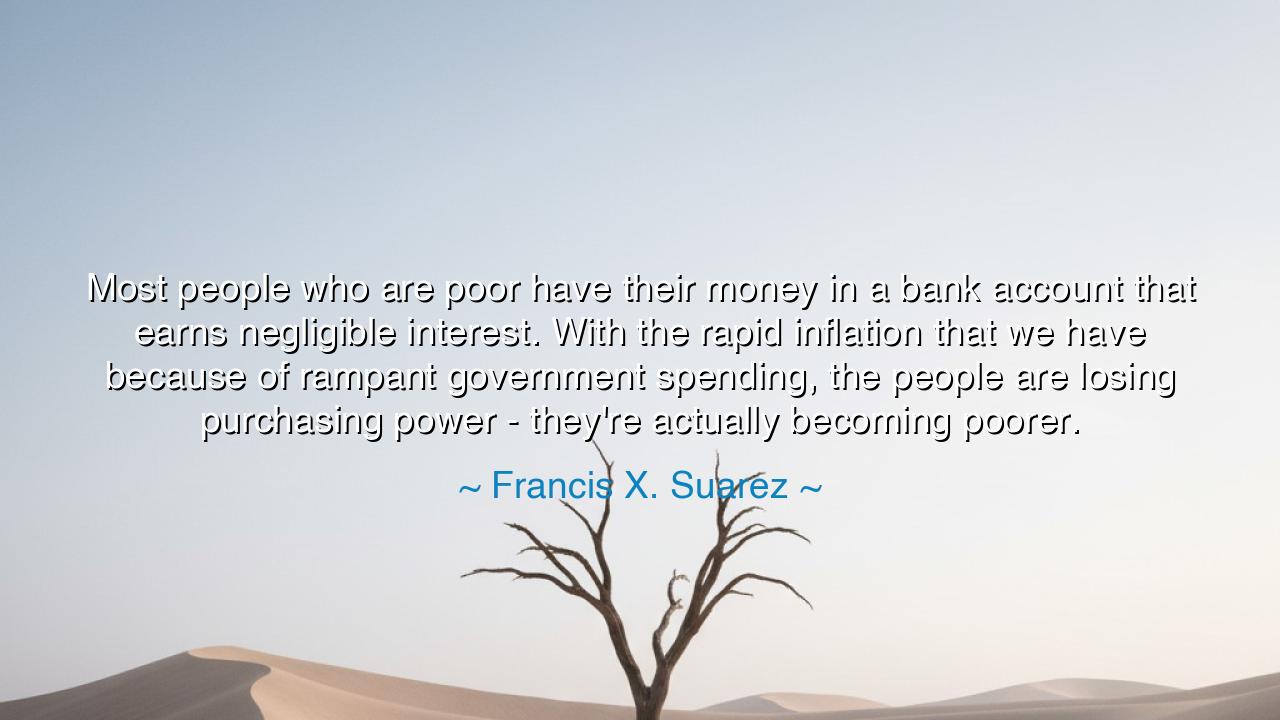
Most people who are poor have their money in a bank account that
Most people who are poor have their money in a bank account that earns negligible interest. With the rapid inflation that we have because of rampant government spending, the people are losing purchasing power - they're actually becoming poorer.






Hear, O children of prudence and watchers of the world’s wealth, the words of Francis X. Suarez, who declared: “Most people who are poor have their money in a bank account that earns negligible interest. With the rapid inflation that we have because of rampant government spending, the people are losing purchasing power—they're actually becoming poorer.” In these words lies a lament both ancient and modern—a warning that echoes through the halls of history whenever rulers forget the sacred balance between creation and consumption, between currency and conscience. Suarez, a man of public duty and economic awareness, speaks not as a mere critic, but as one who sees the silent erosion of human dignity beneath the tides of inflation and mismanagement.
The origin of this quote lies in the turmoil of modern economics, when nations wrestled with rising prices and declining faith in fiscal discipline. Suarez, the mayor of Miami and a voice for innovation in finance, spoke as both leader and observer. He had seen how government overspending, though often cloaked in the language of compassion, leads to a cruel paradox: those it claims to help are those it harms the most. For when money is created without restraint, its value withers like a leaf in drought. And while the wealthy shield their fortunes in investments, the poor—whose modest savings rest in banks yielding almost nothing—watch their purchasing power melt away, unseen, unspoken, but deeply felt.
This truth, though wrapped in modern language, is as old as civilization itself. Consider Weimar Germany after the First World War. Crushed by debt and reparations, the government printed rivers of paper money to ease its burden. For a moment, the illusion of prosperity returned. But soon bread cost millions of marks, savings turned to dust, and families carried wheelbarrows of cash to buy a loaf. The working class, who trusted in banks and wages, found themselves destitute, while speculators thrived. In this tragic mirror, Suarez’s words find their reflection: when governments inflate without discipline, they steal not by law, but by stealth—from the very hands of their people.
Inflation, he warns, is not merely an economic ailment but a moral failing—a symptom of shortsighted governance and forgotten restraint. It punishes the patient, the savers, the laborers who seek stability. It rewards the reckless, the indebted, the powerful who play with credit and escape accountability. Thus, Suarez’s lament becomes a call to moral responsibility in governance: that leaders must think not only of the next election, but of the next generation; not only of prosperity measured in numbers, but of justice measured in stability.
Yet within this warning lies a deeper wisdom: the solution begins not only in the halls of government, but in the hearts of the people. Suarez, an advocate for financial literacy and innovation, urges citizens to awaken from passivity—to understand money, to diversify, to protect their labor from decay. In a world where banks offer crumbs of interest and inflation devours quietly, the people must learn to think beyond mere saving. Investment, education, and vigilance become the shields of the modern citizen against the silent thief of inflation.
There is an echo here of the ancient Joseph of Egypt, who, foreseeing seven years of famine, stored grain in the years of plenty. His wisdom saved nations because he understood the rhythm of abundance and scarcity, the necessity of planning beyond the present comfort. Suarez’s teaching stands in the same lineage: to endure the storms of economy, one must act with foresight, not fear; with prudence, not complacency.
The lesson, then, is both moral and practical. Trust not in governments that spend beyond measure, nor in systems that promise security without substance. Learn the language of finance as you would the language of freedom, for ignorance is costly, and complacency fatal. Support policies of restraint and sustainability; demand transparency in the stewardship of public wealth. And for yourself, be not merely a saver, but a wise steward—turn your earnings into tools that endure beyond the whims of inflation.
Thus, the words of Francis X. Suarez are not merely about money—they are about the preservation of dignity and the responsibility of awareness. They remind us that poverty is not always born of laziness or fate, but often of systems that quietly erode the fruits of honest labor. Guard, therefore, your wealth, your wisdom, and your will. For the fate of nations—and of every humble saver within them—depends not on the abundance of their money, but on the virtue of how it is made, managed, and maintained.






AAdministratorAdministrator
Welcome, honored guests. Please leave a comment, we will respond soon